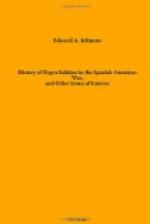COLONEL ROOSEVELT’S ERROR.
TRUE STORY OF THE INCIDENT HE MAGNIFIED TO OUR HURT—THE WHITE OFFICERS’ HUMBUG SKINNED OF ITS HIDE BY SERGEANT HOLLIDAY—UNWRITTEN HISTORY.
To the Editor of the New York Age:
Having read in The Age of April 13 an editorial entitled “Our Troops in Cuba,” which brings to my notice for the first time a statement made by Colonel Roosevelt, which, though in some parts true, if read by those who do not know the exact facts and circumstances surrounding the case, will certainly give rise to the wrong impression of colored men as soldiers, and hurt them for many a day to come, and as I was an eye-witness to the most important incidents mentioned in that statement, I deem it a duty I owe, not only to the fathers, mothers, sisters and brothers of those soldiers, and to the soldiers themselves, but to their posterity and the race in general, to be always ready to make an unprejudiced refutation of such charges, and to do all in my power to place the colored soldier where he properly belongs—among the bravest and most trustworthy of this land.
In the beginning, I wish to say that from what I saw of Colonel Roosevelt in Cuba, and the impression his frank countenance made upon me, I cannot believe that he made that statement maliciously. I believe the Colonel thought he spoke the exact truth. But did he know, that of the four officers connected with two certain troops of the Tenth Cavalry one was killed and three were so seriously wounded as to cause them to be carried from the field, and the command of these two troops fell to the first sergeants, who led them triumphantly to the front? Does he know that both at Las Guasima and San Juan Hill the greater part of troop B, of the Tenth Cavalry, was separated from its commanding officer by accidents of battle and was led to the front by its first sergeant?
When we reached the enemy’s works on San Juan Hill our organizations were very badly mixed, few company commanders having their whole companies or none of some body else’s company. As it was, Capt. Watson, my troop commander, reached the crest of the hill with about eight or ten men of his troop, all the rest having been accidentally separated from him by the thick underbrush during the advance, and being at that time, as was subsequently shown to be the firing line under some one else pushing to the front. We kept up the forward movement, and finally halted on the heights overlooking Santiago, where Colonel Roosevelt, with a very thin line had preceded us, and was holding the hill. Here Captain Watson told us to remain while he went to another part of the line to look for the rest of his troop. He did not come to that part of the field again.




